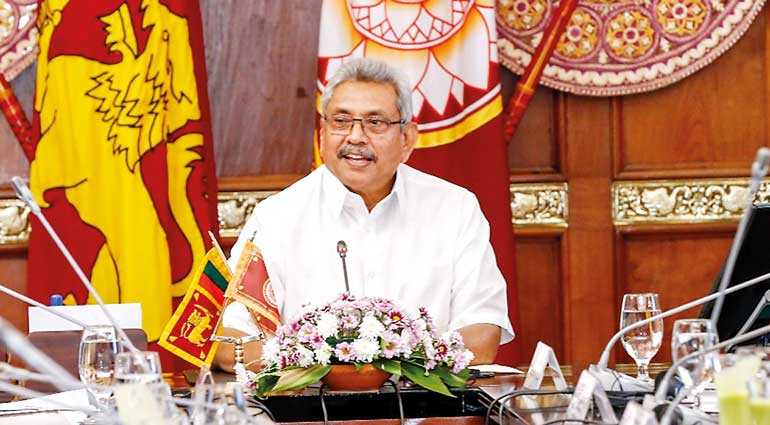Sunday Feb 22, 2026
Sunday Feb 22, 2026
Monday, 20 January 2020 04:16 - - {{hitsCtrl.values.hits}}

President Gotabaya Rajapaksa
Cabinet approval given to proposal by President for full implementation of SDPA Act in bid to boost FDI
Last Govt. placed restrictions on use of Act which provides tax holiday up to 25 years to foreign investors
Decision to restrict use of SDPA hampered international investor sentiments
Cabinet told Business Confidence Index (BCI) recorded 75% basis points increase in December, highest since September 2015
Attributes this to reduction in VAT, appointment for professionals to Boards, curtailed unproductive expenditure etc.
Cabinet also approves proposal to proceed with amendments to income tax laws
By Chandani Kirinde
The Government is to fully implement the Strategic Development Projects Act (SPDA) with immediate effect, the use of which was restricted under the previous Government, in a bid to attract international investors.
Cabinet approval was given last week to a proposal by President Gotabaya Rajapaksa for the immediate and full implementation of the SPDA together with the Board of Investment Act, the Urban Development Authority Act and other related laws to be applicable to all investments in the country.
Cabinet also gave approval to proceed with amendments to the income tax laws and to authorise the Prime Minister and Finance, Economy and Policy Development Minister Mahinda Rajapaksa to take relevant steps to announce the SDPA is now in force.In the Cabinet paper, it has noted that the previous Government had put restrictions in place in the way the SDPA was implemented limiting the law only apply projects for which approval was granted prior to 2016, with the promise a new investment law would be introduced.
However, the SPDA was not repealed but put to limited use administratively while the last Government also failed to introduce a new investment law. The last approval granted under the SPDA had been to two companies associated with the Hambantota Port Project.
“The decision to restrict the usage of the SDPA is obviously a primary cause attributable to hampering of international investor sentiment in Sri Lanka, in addition to the adverse impact of some investments taken by the previous Government to implement a complex tax system, over regulate business and economic transactions, run down the public service delivery mechanism and important Strategic State Enterprises that have incurred huge losses due to lack of competent management,” Cabinet was informed.
The new Government, it said, has initiated several processes and procedures to simplify the Government service delivery and the tax system, strengthen management of State enterprises by appointing professionals to Board of Directors, curtailed unproductive expenditure and formed a 15-member Cabinet to improve confidence of the public and the business community.
This has been reflected in the Business Confidence Index (BCI) which recorded an increase of 75% basis points in December, the highest seen since September 2015. The tax reforms, reduction of VAT to 8% from 15%, lower Government expenditure as well as other changes, seem to have endeared the Government, both business and consumers.
The Cabinet paper said that all evidence support a stable recovery in the tourism sector in the coming tourist season in the background for improving security conditions while agriculture sector is also thriving while the plantations sector has benefited from the safeguard measures that the Government has introduced.
The full implementation of the SDPA is to further consolidate public confidence and business sentiments which is essential for an economic turnaround to which the Government is deeply committed, Cabinet was informed.
The SDPA was enacted in 2008 to facilitate an attractive legal and tax regime to investors looking at investments of strategic importance in Sri Lanka and also to ensure that the related investment approval process is streamlined so that project approval can be conducted in an expeditious manner.
It was amended in 2011 and 2013 to broaden the scope of the incentives that could be granted to investors.
The Act provides for the extension of tax exemptions to identified Strategic Development Projects that are of national interest, up to a period of 25 years.
The tax exemptions are given in consideration of the strategic importance of the projects taking into account the inflow of foreign exchange into the country, employment and income earning opportunities and the transformation of technology and economic landscape.